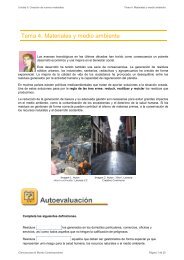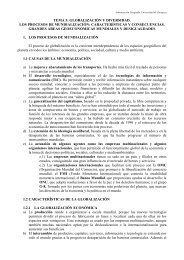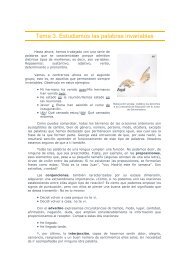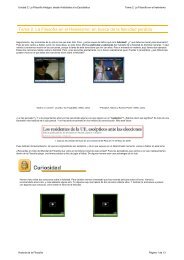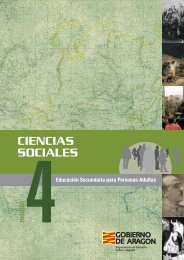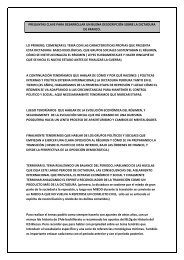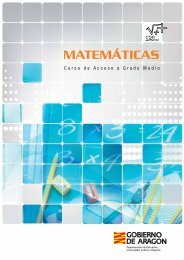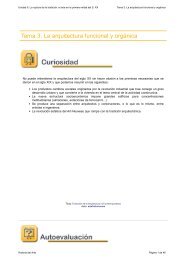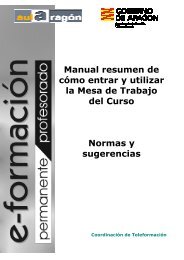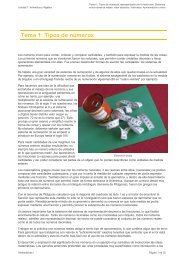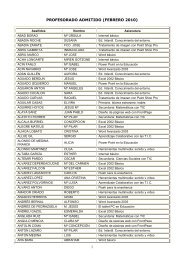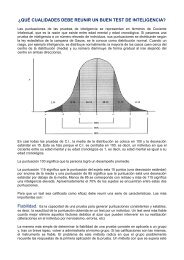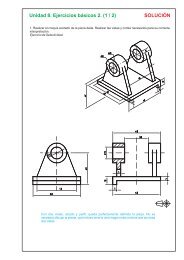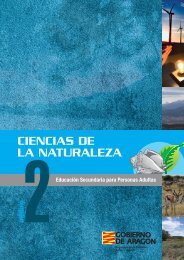Educación Secundaria para Personas Adultas 2módulo - aulAragon
Educación Secundaria para Personas Adultas 2módulo - aulAragon
Educación Secundaria para Personas Adultas 2módulo - aulAragon
Create successful ePaper yourself
Turn your PDF publications into a flip-book with our unique Google optimized e-Paper software.
INGLÉS<br />
Contracciones<br />
was + not : wasn't<br />
were + not : weren't<br />
INTERROGATIVE<br />
Was I? *<br />
Were you?<br />
Was he - she - it?<br />
Were we?<br />
Were you?<br />
Were they?<br />
(la forma interrogativa se traduce igual que la afirmativa con ingerrogación al final)<br />
• En respuesta corta, solo usamos el sujeto y el verbo TO BE.<br />
Were you in the cinema on Saturday night?<br />
Yes, I was / No, I wasn't<br />
THERE WAS / THERE WERE - HABÍA<br />
SINGULAR<br />
PLURAL<br />
There was (había)<br />
There were (había)<br />
There was not no habia There were not<br />
Was there? ¿había? Were there?<br />
SHORT FORM<br />
There wasn't<br />
There weren't<br />
"There was a computer on the desk"<br />
Había un ordenador en la mesa<br />
"There wasn't a glass on the table"<br />
No había un vaso en la mesa<br />
"Was there a ball?"<br />
¿Habia una pelota?<br />
"There were some people in the park"<br />
Había gente en el parque<br />
"There weren't many pupils in the classroom" No había muchos alumnos en la clase<br />
"Were there any cars in the garage?"<br />
¿Habia coches en el garaje?<br />
• Cómo ya vimos en el presente de este verbo there is / there are , en inglés hay que diferenciar si el<br />
objeto directo es singular (there was) o plural (there were), mientras que en español sólo tenemos<br />
una forma: había<br />
THE PAST SIMPLE TENSE (REGULAR VERBS) – EL PASADO SIMPLE<br />
AFIRMATIVA NEGATIVA INTERROGATIVA<br />
I worked yo trabajé I didn't work No trabajé Did I work? *<br />
You worked tú trabajaste You didn't work No trabajaste Did you work?<br />
He/She/It worked él trabajó He/She/It didn't work No trabajó Did he/she/it work?<br />
We worked nosotros trabajamos We didn't work No trabajamos Did we work?<br />
You worked vosotros trabajastéis You didn't work No trabajastéis Did you work?<br />
They worked ellos trabajaron They didn't work No trabajaron Did they work?<br />
*(la forma interrogativa se traduce igual que la afirmativa con ingerrogación al final)<br />
• Formamos el pasado simple de los verbos irregulares añadiendo el sufijo –ed al infinitivo. La forma<br />
es la misma <strong>para</strong> todas las personas:<br />
I watched TV last night<br />
Ví la tele anoche<br />
He watched a film last Saturday Vió una pelicula el sábado pasado<br />
[ 82 ] Módulo 2



